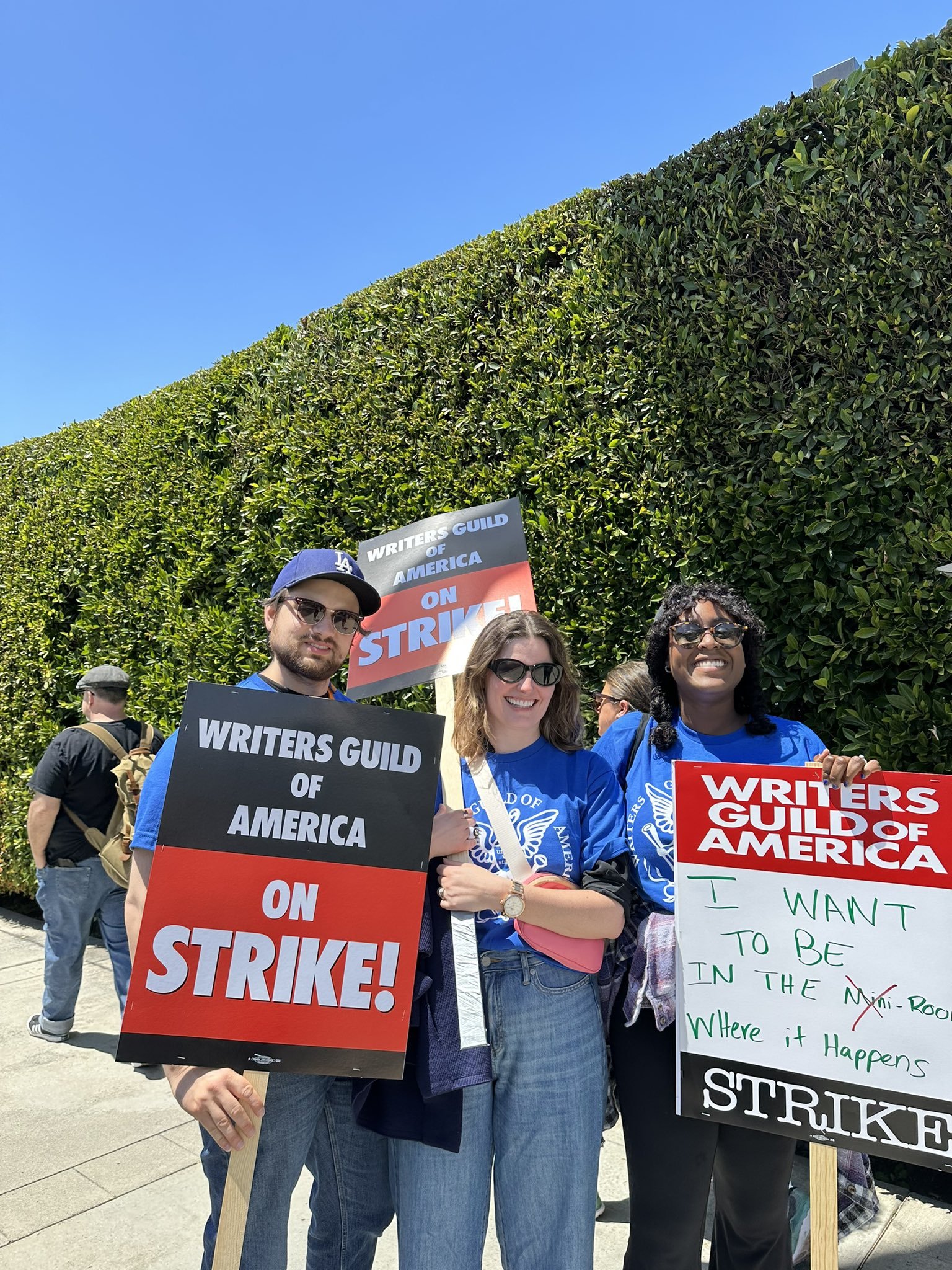3 THINGS YOU NEED TO KNOW ABOUT THE WGA STRIKE
Good Read For Emerging Writers and Entertainment Enthusiasts
The Writer’s Guild of America - which represents approximately 11,500 people who write the Hollywood shows and movies you love - is on strike! As the clock struck midnight on May 1st, the WGA's 3-year contract with the Alliance of Motion Picture and Television Producers (AMPTP) expired. In the six weeks leading up to the deadline, the WGA has been fighting for a new contract that gives writers their fair share for their creative work. The guild's demands include higher minimum pay across all media, improved residuals, fair compensation for TV series writers throughout the entire production process, and increased contributions to pension and health plans. They're also pushing for stronger professional standards and overall protection for writers, and more. The WGA's proposals aim to bring in $429 million more per year for writers, while the AMPTP's counter-offer is just an $86 million bump. You can check out the WGA proposal chart here
There's a lot to unpack about the WGA strike, so we've distilled the info into a quick 5-minute read. Whether you're an indie writer hoping to join the union ranks or just someone fascinated by the inner workings of the film and TV industry, we've got you covered. Here's a summary of three essential things you need to know about the strike.
Bushwick Film Festival Alumni Tess Harrison (left) (2018 BFF short Take Me Out with the Stars) on the picket line during the 2023 WGA Writer’s strike.
1. THE ORGANIZATIONS AT THE TABLE
Who is the WGA and the Alliance of Motion Picture and Television Producers (AMPTP)Sitting on one side of the table is The Writers Guild of America (WGA), the labor union representing professional writers in film, television, radio, and new media across the United States. Split into two branches, the Writers Guild of America, East (WGAE) is based in New York City, while the Writers Guild of America, West (WGAW) calls Los Angeles home.
The WGA is all about safeguarding its members' rights by hammering out contracts, setting industry standards for minimum compensation, regulating working conditions, and ensuring fair distribution of residuals and royalties. The guild also champions writers' creative rights, such as proper attribution and protection against unauthorized changes to their work.
On the other side of the negotiating table sits the Alliance of Motion Picture and Television Producers (AMPTP), a California-based trade association representing over 350 American film and TV production companies. This powerhouse negotiates with entertainment industry unions like SAG-AFTRA, DGA, IATSE, IBEW, Laborers Local 724, Teamsters Local #399, and WGA, fostering collaboration and promoting cooperation.
The AMPTP's member roster reads like a who's who of the entertainment world, including major motion picture studios (Paramount Pictures, Sony Pictures, Universal Pictures, Walt Disney Studios, and Warner Bros.), principal broadcast TV networks (ABC, CBS, FOX, and NBC), streaming services like Netflix, Apple TV+, and Amazon, select cable TV networks, and other independent film and TV production companies.
2. THE BEEF
What are WGA and AMPTP fighting about?
There are a few pressing issues that need to be addressed in the upcoming 3-year contracts negotiated by the Writers Guild of America (WGA) with the AMPTP that are crucial to the fair compensation of writers. Here are three important ones: the impact of streaming services, the creation of the mini room, and the regulation of AI.
Let’s start with streaming services. Shorter seasons and longer gaps between seasons on streaming platforms contribute to a significant decline in writer’s earnings. Streaming showrunners receive a median salary of just 46% of the broadcast median due to contractual differences, despite working similar hours. Thus, writers face challenges in job security and fair compensation. In addition, residual issues have arisen in streaming, with the calculation method not yet on par with broadcast TV. Residuals on streaming platforms are generally lower, even for shows created exclusively for streaming. The WGA argues that writers should share in profits generated by successful streaming shows, a demand previously refused by the AMPTP in negotiations. For example, if a show is successful on Netflix (who like most streamers don’t reveal their numbers) the writer gets very little residuals as income as opposed to if the show was on TV.
The mini-room model is a hot topic for writers, as it treats them like they're disposable and leaves them unpaid during production. This trend, which started a decade ago, has taken off with the rise of streaming shows. Mini rooms hire fewer writers to work on episodes before a show gets the green light, unlike traditional writers' rooms and writers often earn less. This model also splits writing and production, which used to be a combined process. The guild highlights that this separation causes problems, as writers typically advance from entry-level roles to higher-paying, experienced positions through mentorship during production. The ultimate goal for many writers is to become a showrunner, a role that requires experience.
Lastly, the impact of Artificial Intelligence (AI) on the film industry is an emerging challenge for writers, as it threatens to disrupt traditional creative processes and compensation models. The possibility of AI tools being able to generate plots or even entire scripts raises concerns about job security and fair pay for writers. While current AI tools may not yet produce the best quality scripts, the technology is rapidly advancing and could lead to writers being replaced with machines that simply adapt existing ideas rather than creating original content. Moreover, AI-generated content raises questions about credit, residuals, and potential copyright issues. As the industry adapts to new technologies, the Writers Guild of America (WGA) ultimately wants to protect the interests of writers by asking Film and TV studios to regulate the use of AI.
3. STRIKE RULES
What are the strike rules?
All WGA members everywhere are required to follow the following WGA strike rules and non-members who undermine these rules will also have consequences.
Immediately stop writing for all struck companies.
Do not deliver or submit any literary material to a struck company. Do not sign or deliver documents related to writing assignments or the sale or option of literary material to a struck company.
Do not negotiate with struck companies for writing services, and notify your representatives to cease negotiations on your behalf until the strike concludes.
Notify struck companies to return or delete writer-owned “spec” literary material or sample scripts.
Do not discuss future writing assignments or the sale or option of literary material with a struck company.
Do not negotiate with a struck company for the development, financing, or production of a project.
Honor all Guild picket lines and do not enter the premises of any struck company.
Preserve a digital date-stamped copy of all unproduced literary material written for a struck company.
You must inform the Guild of the name of any writer you have reason to believe is engaged in scab writing or other strikebreaking activity.
You must picket and/or perform other strike support duties and cooperate with Guild committees charged with enforcement of the Strike Rules and each Guild’s Constitution.
Do not attempt to negotiate a settlement of the strike with any struck company.
Hyphenates (i.e. members employed in dual capacities such as writer-director, writer-producer, writer-performer, etc.) are prohibited from performing any writing services for a struck company.
Rules pertaining to non-members: The Guild does not have the authority to discipline non-members for strikebreaking or scab writing. However, the Guild can and will bar that writer from future Guild membership. Guild members are asked to report the name of any non-member whom they believe has performed writing services for a struck company.
These rules may sound strict to some, but the purpose of the rules is to win the best possible contract and future for writers. Hopefully, both sides can come to an agreement soon because there is a lot at stake. We hope this helps you wrap your mind around the strike and if you want to dig in a little deeper, below are some articles you can explore.
Must Read Articles About the Writer’s Strike
https://deadline.com/feature/hollywood-writers-strike-wga-explained-1235341146/
https://www.nbcnews.com/pop-culture/pop-culture-news/writers-strike-2023-wga-pay-negotiations-rcna82236
https://www.wgacontract2023.org/strike/strike-rules
https://variety.com/2023/biz/news/wga-strike-rules-1235594857/
https://www.hollywoodreporter.com/business/business-news/writers-guild-streaming-report-members-falling-behind-1235352341/
https://www.hollywoodreporter.com/business/business-news/writers-guilds-negotiations-team-interview-strike-mini-rooms-1235352708/
https://www.vox.com/culture/23696617/writers-strike-wga-2023-explained-residuals-streaming-ai



